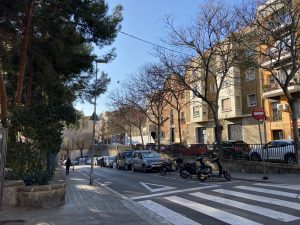
This is the picture I took in Barcelona
I have been traveling to Barcelona last year. Despite the awe I was experiencing with the beautiful buildings — more specifically, Guell Park and La Sagrada Familia — I was fascinated with the fact that those small villages that we usually never pay attention to when we travel was surprisingly similar to the small town in Korea. It might be a coincidence, but as I read the book [The Time of the Doves], I could realize the reason why.
“And we lived. We still went on living. And I didn’t know anything about what was going on […]” (141)
As I went through the book, I was having a sympathy-like emotions to the protagonist, Natalia. Although the Spain, and specifically Catalonia itself, is a beautiful city, there is a harsh wound from the history hidden from the foreigners, which was the point where I felt the feeling of sympathy. South Korea is also a country where the civil war was held, and is still ongoing. It is often easier to focus the war itself and the sacrifice of soldiers, and neglet our attention from the common people who has to struggle within day-to-day life. I was enjoying the way Rodoreda explains the life during wartime, in one of a person’s eyes. It was a great moment to experience their life.
“[…] and pour the acid into them and then pour it into myself and that way we’d put an end to it all and everyone would be happy since we wouldn’t have done anybody any harm and no one loved us.” (146)
This personal impression on this book and Natalia got me thinking the morality of her act of attempting murder her kids. Indeed murder, especially filicide, is a morally terrible thing to do as a parent. However, the situation she was facing was extreme — in the middle of the wartime, her husband, Quimet, had been killed in action, she couldn’t even buy a food to eat. In other words, she was barely being survived in a day-to-day life.
Despite the fact that it is ethically wrong, this hardships Natalia was facing made me doubt on quintessential view of morality, especially on parenting. Of course it was a hard decision to make for her to kill herself and her kids. Personally I think it is morally wrong in a common sense, but I feel hesitant myself to criticize her decision.
Do you think it is necessary to put situational factors when we judge people’s morality and ethics of their actions?
“There is a harsh wound from the history hidden from the foreigners…” I find this idea revealing because it goes very well with one of the themes of the novel: it is also a meditation on the hidden. The distribution of spaces in the narrative is very curious, from the suffocating spaces of Natalia and Quimet’s apartment to the open Plaza del Diamante, which gives the book its title in Catalan. Speaking of Park Güell, it is striking that in addition to being spacious, it has a very particular architecture, if you remember. Natalia contemplates there a dance of forms in which the organic and the artificial, the animal and the human, the open and the closed are confused, in dancing colors.
Hi, I enjoyed reading your blog post. Just like you, I too sympathised with natalia and the hardships she had to go through. To answer your question, i think we should take in account the situational factors when we are to judge a person’s morality or ethics of their action. To support my answer I will have to defend Nataila for planning out to “murder” her children in the time of war as she felt that she could not provide a good living for her kids. If it weren’t for this situation of war she would not have to take such extreme measures.
Hi, thanks for your post and the picture of Barcelona! I think it is really important to consider situational factors when judging someone’s ethics. It relates to basic ethics questions like “is it ok to steal for your starving family” and other classic questions that make us consider what is right or wrong. I would argue that there are very few universals that exist in this world, even on the more extreme. Also, I don’t think saying someone is just for a certain choice is saying that is the correct or even ethical choice. It is just accepting that situations can lead to erratic behaviour that can at least be explained.